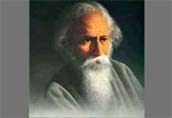By Aly Zaker
 It was in August of 1971. I was on an official mission of the Swadhin Bangla Betar Kendra, escorting some foreign dignitaries to the refugee camp in the Salt Lake area ofCalcutta. After my official duty was over as I was getting ready to leave, I heard that the Mukti Shangrami’ Shilpi Shangstha, led by Wahidul Huq and Sanjida Khatun, was corning to the camp to present their Rupantorer Gaan to enthuse and inspire the inmates of the camp.I knew most in the group fora long time. And, needless to say, was interested to hear their songs. Iknew many of the songs that this group, mostly belonging to Chhayanaut, used to sing in those days. Those usually were songs of Rabindranath with nationalistic fervour. So, half expecting what to hear, I made a place for myself in front. To my utter surprise what I heard was something that I had never heard before. First I thought that it was some song other than that of Rabindranath. But then his songs have a definite style. So, however unknown it may have appeared in the beginning, it did assume the style of his own eventually. And I was bewildered. I think it would be in order to share what was going through my mind and bring the mystery to an end . Therefore, permit me to quote the song here in my inadequate adaptation from original Bangla to my illiterate English:
It was in August of 1971. I was on an official mission of the Swadhin Bangla Betar Kendra, escorting some foreign dignitaries to the refugee camp in the Salt Lake area ofCalcutta. After my official duty was over as I was getting ready to leave, I heard that the Mukti Shangrami’ Shilpi Shangstha, led by Wahidul Huq and Sanjida Khatun, was corning to the camp to present their Rupantorer Gaan to enthuse and inspire the inmates of the camp.I knew most in the group fora long time. And, needless to say, was interested to hear their songs. Iknew many of the songs that this group, mostly belonging to Chhayanaut, used to sing in those days. Those usually were songs of Rabindranath with nationalistic fervour. So, half expecting what to hear, I made a place for myself in front. To my utter surprise what I heard was something that I had never heard before. First I thought that it was some song other than that of Rabindranath. But then his songs have a definite style. So, however unknown it may have appeared in the beginning, it did assume the style of his own eventually. And I was bewildered. I think it would be in order to share what was going through my mind and bring the mystery to an end . Therefore, permit me to quote the song here in my inadequate adaptation from original Bangla to my illiterate English:
“I travel from place to place singing the song of your distress. /1 wander through the cities, meadows and in the forests. Tears roll down from my eyes/ and the heart of the rock melts listening to the story of your anguish./ Millions of hearts are ignited by your sorrow, and they start to sing together —I Fire emits from the eyes. The apparent vacuum trembles by that thunderous sound that transcends the sky./ Everyone looks down in mortal fear. I have no brother or friend but you./ You are my father, you are my mother, and you are everything to me./ I shall cry in your despair and make others cry in your distress./ I live because of you and shall not hesitate .to die for you./ I shall forebear all your sadness happily to see your happy face.”
I thought it really takes a visionary to write and compose a song over a hundred years ago, for here and now. In a camp where a multitude of human beings were living in sub-human conditions, under a thatch, within a drain pipe, under the open sky braving hunger and diseases and hoping that they’d be able to wrest the freedom of their motherland someday When Tagore wrote this song, he was barely 20. My guess is that he must have composed it to. record his feelings about India groaning under the colonialist British. But I was appalled to discover how contemporary he sounded for us even after 90 years, in 1971. This, I thought, is what makes a great visionary who can cut across centuries and, become contemporary forever.
I have, in my own limited capacity, tried to explore the relevance of Rabindranath in today’s society. This piece could be considered a curtain raiser to what I finally intend to do. In my intended work I wish to cover his songs, plays, and to a lesser
degree some of his poems. Let us take a look at one or two of his very easygoing didactic couplets for the purpose of establishing his relevance to our present day society. Our world today is continuously plagued by communal disharmony. This is more due to formal interpretation of religion than the soul contained In it. For instance in one of his poems he said and I adapt, “The festival of chariots goes on unabated with lots of fanfare. Thousands of people flock together. The devotees lie prostrate in front of the chariots on the roads to offer their respect. The road thinks ‘I am the God’,, the chariot thinks ‘I am HIM’, the effigy thinks, ‘I am…’, and the Lord God laughs out loud.” And another, “The moon says, ‘I washed the world with light. Whatever the stain there is, I have kept just for myself’~ Yet another, “Who is it that will relieve me of my duties?’ says the setting sun. The world remains speechless. The tiny clay lamp whispers, ‘My Lord, I shall try and do my best”. These little snippets of verses are universal at anytime and in any society.
I shall now try to focus on the subject that I feel more comfortable with. Ws the plays of Unbindranath. Permit me to quote some dialogues from some of the plays that we have staged and some that I ldve. Our very recent production of ‘Ocholayatan’ has some profound dialogues that transcend the barrier of time and space. Here Dada Thakur, the mentor of the down-trodden in this play, says to the rebel Panchak, “The boy who does not have confidence cries out in the dark when he cannot see his mother. The one, who has confidence , finds the mother if only he stretches his mind. lithe mother asks, need lights?’ the son says, ‘when you are there, light and darkness are no different for me.” ‘Raktokorobi’ is one of the most famous of his plays, in which the heroin of the play, ‘Nandini’ and the villain, ‘The King’ constantly confront each other. Tagore described Nandini as the inarticulate east and the King as megalomaniac west. The King tries to frighten Nandini by his antiques to which Nandini says, ‘Do you love to see people frightened by you? Srikantha of our village acts as the monster in the Jatra. When he acts, people are frightened and that t makes him very happy. It seems like the people here are in the business of frightening others. That is why they have surrounded you with a net of mystery. Aren’t you ashamed of feigning to be a monster?” Here are a few dialogues from his immortal play ‘Muktodhara’, where King Ranajit accuses Dhononjoy Boiragi, the singer, of inciting the, people not to pay land revenue. The conversation goes like this:
Ranajit: Tell me whether you will pay the revenue.
Dhononjoy: No, My King, I will not.
Ranajit:You will not? What insolence!
Dhononjoy I cannot give you something that is not yours.
Ranajit: Not mine?
Dhononjoy: My surplus food is yours; food for my hunger is not.
Such was Tagore’s insight to humanity. At any age he would be a contemporary. These are but only a few examples. A full research would reveal the validity of my assertion. In this l5Othyear of his anniversary of birth we all are reminded once again that just ‘one’ Rabindranath as a humanist, moralist and intellectual could be enough for a nation to be proud of.

